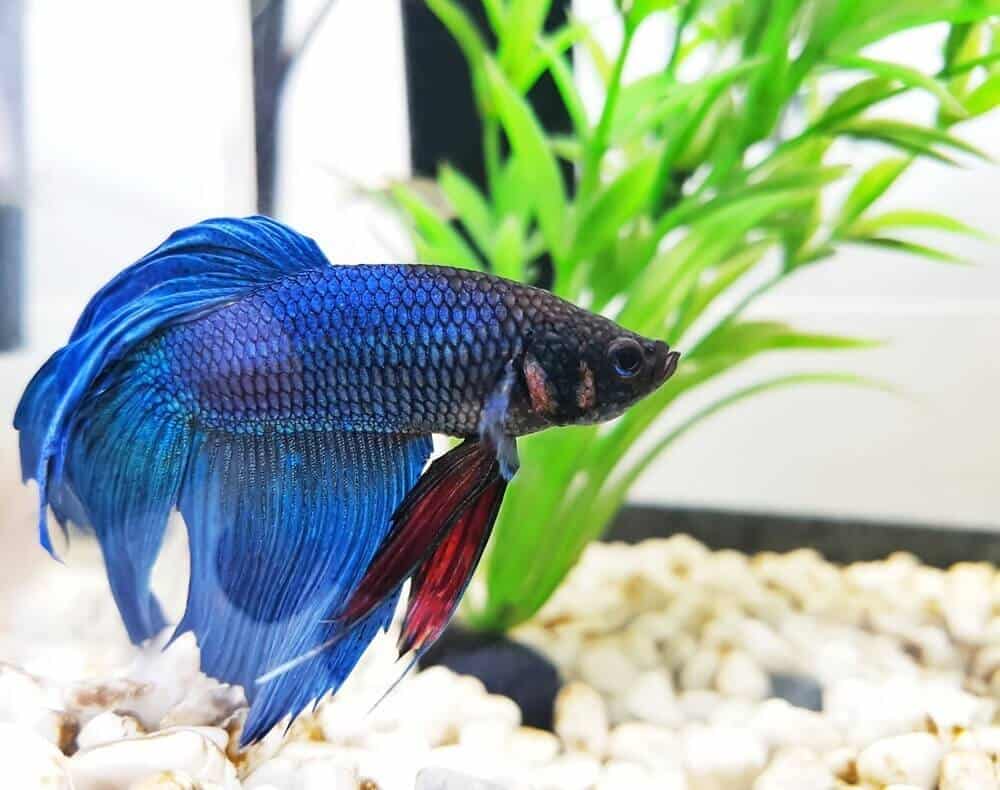In this article Show
Today, we’re exploring a fascinating aspect of betta fish care – their remarkable ability to regenerate fins. If you’re a betta fish owner or considering becoming one, understanding this natural process is crucial for maintaining the health and beauty of these vibrant creatures.
Betta fish, also known as Siamese fighting fish, are known for their striking colors and elegant, flowing fins. These features not only make them a popular choice for home aquariums but also play a vital role in their survival and behavior.
However, their delicate fins can be prone to damage, raising a common concern among owners: can betta fish grow their fins back? In this post, we’ll shed light on the regenerative capabilities of betta fish fins. We’ll cover everything from the causes of fin damage to how you can aid in their recovery.
Can betta fish grow their fins back?
Yes, betta fish can indeed grow their fins back. This remarkable ability is a testament to their resilience and adaptability. When a betta fish experiences fin damage, whether from fin rot, physical injury, or environmental stress, it has the biological capability to regenerate lost or damaged fin tissue.
Causes of Fin Damage in Betta Fish
The following are the various causes of damage fin in betta fish;
1. Fin Rot
Fin rot is a common yet serious ailment in betta fish, often stemming from bacterial or fungal infections. It usually occurs in poor water conditions and can be identified by frayed, discolored, or receding fins.
Prevention is key and involves maintaining clean water, regular tank cleaning, and avoiding overcrowding. If you notice signs of fin rot, prompt water changes and appropriate medication are essential to halt its progression and promote healing.
2. Physical Injuries
Physical injuries to betta fins can occur due to sharp decorations, aggressive tank mates, or even mishandling. These injuries appear as tears or nips on the fins.
To prevent such damage, ensure your aquarium is free of sharp edges and consider the temperament of any other fish in the tank. If an injury occurs, isolate the betta if necessary, and maintain pristine water conditions to prevent infection and support fin regeneration.
3. Environmental Stressors
Environmental stressors, including poor water quality, incorrect pH levels, and temperature fluctuations, can significantly impact betta fish fin health. Stress weakens their immune system, making them more susceptible to diseases like fin rot.
Regularly monitor your tank’s conditions using a reliable testing kit. Keeping a stable and suitable environment is crucial for the overall health and well-being of your betta fish, ensuring their fins remain healthy and intact.

Caring for a Betta Fish with Damaged Fins
Immediate Steps to Take When Noticing Fin Damage
When you first notice fin damage in your betta fish, immediate action is crucial. Start by isolating the fish if it shares a tank with others, to prevent further stress or injury. Next, perform a water change to ensure the environment is clean and free of contaminants that could hinder healing.
Assess the extent of the damage and consider using a water conditioner or adding aquarium salt to the water to promote healing and prevent infections. If the damage seems severe, consulting a veterinarian or a fish health expert is advisable.
Creating an Optimal Environment for Fin Regeneration
The right tank environment is vital for fin regeneration. Maintain a consistent water temperature suitable for bettas, ideally between 76 to 80 degrees Fahrenheit.
The water quality should be impeccable, with regular testing and maintenance to keep ammonia and nitrite levels at zero, and nitrates low. A calm environment is also essential, so avoid excessive light, noise, or movement around the tank. Provide plenty of hiding spaces where your betta can feel secure and stress-free.
Diet and Nutrition for Promoting Fin Health
A nutritious diet plays a significant role in fin regeneration. Offer high-quality betta pellets that cater to their carnivorous nature, rich in protein and essential nutrients. Including variety in their diet, such as frozen or live food like brine shrimp or daphnia, can boost their overall health and vitality.
Omega-3 fatty acids, found in some fish foods, are particularly beneficial for fin regrowth. Ensure regular feeding, but avoid overfeeding, as it can lead to poor water quality and additional stress on your betta fish.
Preventing Fin Damage in Betta Fish
Best Practices for Betta Fish Care
Preventing fin damage in betta fish starts with proper care. First and foremost, understand their needs: bettas are tropical fish requiring warm, clean water and a diet rich in protein. They thrive in a peaceful environment and do not fare well with aggressive tank mates.
Ensure their tank is spacious enough for swimming and exploring, ideally not less than 5 gallons. Regularly check water parameters like pH, ammonia, nitrite, and nitrate levels to maintain a healthy environment.
Tank Environment and Maintenance Tips
The tank environment plays a pivotal role in preventing fin damage. Avoid decorations with sharp edges or rough surfaces that could potentially harm your betta’s delicate fins. Opt for silk plants over plastic ones to create a safe, fin-friendly environment.
Regular tank maintenance is crucial: perform partial water changes weekly to keep the water fresh and clean, and clean the substrate and decorations to prevent the buildup of harmful bacteria. Keeping the tank covered is also a wise practice, as bettas are known to jump.
Monitoring and Regular Health Check-ups
Consistent monitoring is key to the early detection and prevention of fin issues. Observe your betta fish daily for any signs of stress or illness, such as changes in behavior, appearance, or eating habits. Pay special attention to their fins for any signs of tearing, fraying, or discoloration.
Regular health check-ups from a veterinarian experienced with fish can be invaluable, especially if you notice any concerning signs. They can offer professional advice and treatment options to keep your betta in optimal health. Remember, prevention is always better than cure, and a well-cared-for betta is more likely to have a healthy, vibrant life.










